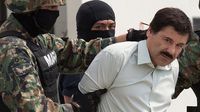On June 9, 2025, the Trump administration escalated its crackdown on the Sinaloa Cartel by imposing sweeping sanctions against two fugitive sons of the notorious drug lord Joaquín "El Chapo" Guzmán. Iván Archivaldo Guzmán Salazar and Jesús Alfredo Guzmán Salazar, leaders of the cartel's violent faction known as "Los Chapitos," are now the subjects of a $10 million reward each for information leading to their arrest or conviction. The move marks a significant step in the U.S. government's ongoing efforts to dismantle the cartel's operations and stem the deadly flow of fentanyl into American communities.
Los Chapitos, under the direction of El Chapo's sons, have emerged as a powerful and ruthless faction within the Sinaloa Cartel. Since their father's imprisonment in 2017, Iván and Jesús have taken the reins of the organization, orchestrating a sophisticated network of clandestine fentanyl labs and trafficking routes that funnel synthetic opioids into the United States. According to Treasury Secretary Scott Bessent, "Los Chapitos is a powerful, hyperviolent faction of the Sinaloa Cartel at the forefront of fentanyl trafficking into the United States." He emphasized the administration's commitment, stating, "At the Department of the Treasury, we are executing on President Trump's mandate to completely eliminate drug cartels and take on violent leaders like 'El Chapo's' children. Treasury is maximizing all available tools to stop the fentanyl crisis and help save lives."
The fentanyl crisis has devastated American communities, with tens of thousands of overdose deaths each year linked to the synthetic opioid. Los Chapitos' control over precursor chemicals—primarily sourced from China—and their operation of secret laboratories in Sinaloa have enabled them to manufacture counterfeit pills laced with fentanyl. These pills are then trafficked across the southern border, fueling the ongoing public health emergency.
In addition to sanctioning Iván and Jesús, the Treasury Department targeted the broader Los Chapitos faction and a network of associates and front companies based in Mazatlán, Mexico. Among those sanctioned are Victor Manuel Barraza Pablos, who manages cartel activities in Mazatlán, and businessman Jose Raul Nunez Rios along with his make-up artist wife, Sheila Paola Urias Vazquez. This couple is believed to finance a key Los Chapitos cell engaged in drug trafficking, extortion, kidnapping, and money laundering. Ten businesses connected to Nunez have also been blocked, signaling a comprehensive effort to disrupt the cartel's financial infrastructure. All property and interests owned directly or indirectly by the Guzmán brothers and these associates are now frozen, and any transactions involving them are prohibited within the United States.
The sanctions follow the Trump administration's earlier designation of the Sinaloa Cartel as a Foreign Terrorist Organization and Specially Designated Global Terrorist group in February 2025. This designation empowers the U.S. government to apply a broader range of sanctions and legal tools against the cartel and its members. The move was hailed by Doug Quets, father of U.S. Marine Nicholas Quets, who was killed in Sonora, Mexico, in 2024—a tragedy linked to cartel violence. Quets said, "The designation of the Sinaloa Cartel as a Foreign Terrorist Organization (FTO) was a vital first step in honoring Nicholas’ memory and protecting other Americans from suffering similar tragedies. It sends a clear message: Those who target U.S. citizens—no matter where they are—will face the full force of American resolve."
While Iván and Jesús remain fugitives believed to be hiding in Mexico, their half-brothers Ovidio Guzmán López and Joaquín Guzmán López are currently incarcerated in the United States. Ovidio, nicknamed "El Ratón," was arrested in Mexico in 2023 and extradited to the U.S., facing charges in Chicago related to money laundering, drug trafficking, and firearms offenses. Joaquín was apprehended in El Paso, Texas, in 2024 and is held on similar charges. Both brothers initially pleaded not guilty but are now expected to change their pleas to guilty. In a notable development, federal prosecutors announced in May 2025 that they would not seek the death penalty against Joaquín if convicted.
The history of the Sinaloa Cartel is one of both vast criminal enterprise and dramatic law enforcement efforts. Founded in the 1970s, the cartel rose to international infamy under El Chapo's leadership, smuggling billions of dollars’ worth of cocaine, heroin, methamphetamine, and later fentanyl into the United States. El Chapo himself was convicted in 2019 on multiple conspiracy counts and is serving a life sentence at ADX Florence, a federal supermax prison in Colorado. His previous escapes from high-security prisons in Mexico only added to his notoriety.
Despite the incarceration of its founder and some of his sons, the cartel’s influence has not waned. Instead, it has fragmented, with Los Chapitos emerging as a dominant faction. They combine brutal enforcement methods with a high-tech production chain, utilizing precursor chemicals from China to manufacture fentanyl in clandestine labs. This approach has allowed them to maintain their grip on the illicit drug trade, particularly fentanyl trafficking into the United States.
The Trump administration's announcement of sanctions and multimillion-dollar bounties on Iván and Jesús comes amid growing calls in Washington for more aggressive action against Mexican drug cartels. The fate of El Chapo's sons could become a test case in international law enforcement cooperation and a barometer of the U.S. government's resolve to combat the fentanyl epidemic. As the Treasury Department continues to leverage all available tools, the message is clear: the fight against drug cartels and the fentanyl crisis remains a top priority.



